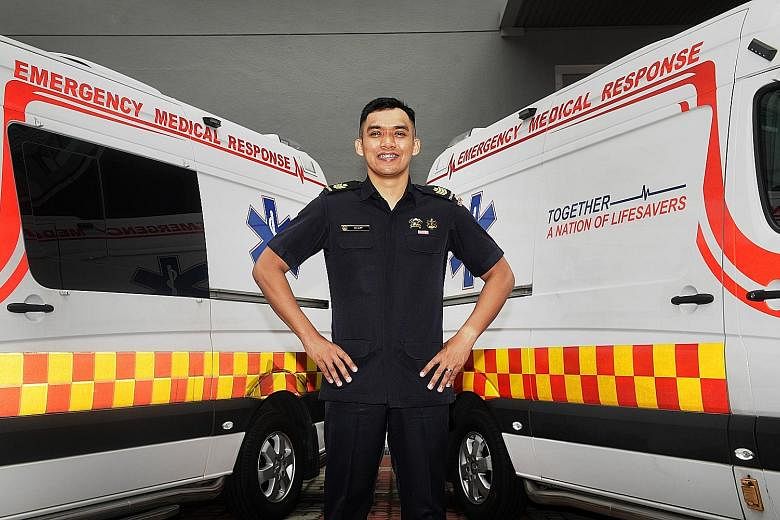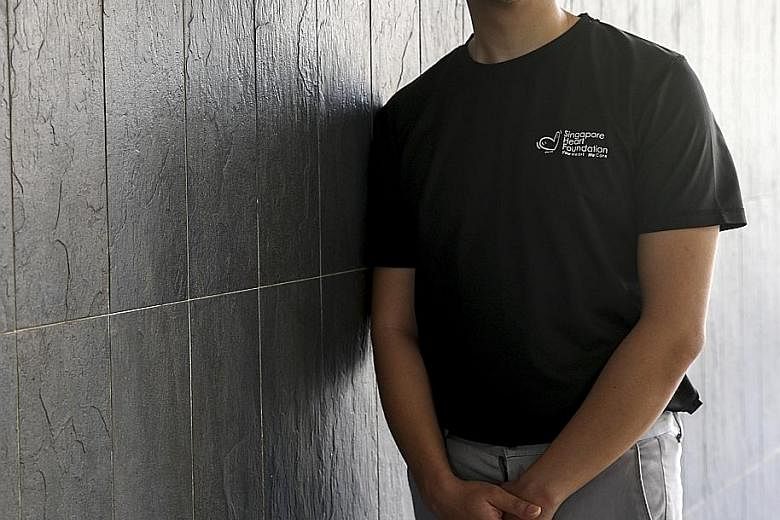The workload of emergency medical technician Mohammad Aliff Rosli increased last year with the onset of the Covid-19 pandemic, as the Singapore Civil Defence Force (SCDF) took on additional duties, including taking Covid-19 patients to hospital.
The challenge was daunting at first, as less was known about the disease in the early stages, he said, and there was the risk of being exposed to the virus.
"Our primary concern was always (the possibility of) bringing home the virus and infecting others at home. Especially for me, as I have an elderly grandmother who might be more susceptible to this, and a wife with a weaker immune system than normal," he said.
But extra precautions were taken, such as ensuring that the showers taken before heading home were done more thoroughly.
He also leaned on the support of his colleagues and family, whom he described as close-knit. He and his family typically talk about their daily experiences at home over the dinner table.
"Even though I'm the front-liner, it's like we are going through all this together," he said.
Staff Sergeant (SSG) Aliff, 27, is among some 1,400 SCDF personnel who were involved in Covid-19 operations last year. They included paramedics and 995 operations centre specialists.
During the year, SCDF transported about 2,000 Covid-19 positive cases and more than 8,300 suspected cases. More than 60 cases among the suspected were later found to have the coronavirus.
SSG Aliff, who works at Alexandra Fire Station, typically responds to emergency medical cases such as cardiac arrest, major trauma cases and stroke.
The SCDF responded to 190,882 emergency medical services (EMS) calls last year. The total number of calls decreased by 0.3 per cent from 2019, but there was a surge in calls involving migrant worker dormitories, with about 4,000 such calls.
On how the workload has increased, SSG Aliff said that although the number of shifts has remained the same, there are precautions that need to be taken for Covid-19-related cases. For instance, disinfecting the ambulance after each such call takes about two hours.
Asked for his thoughts as a front-line worker, he said: "It's a job that needs to be done - someone has to do it. To me, I think it's a higher calling to help others when they are in need."
In his view, civil defence is not just for front-liners, but involves everyone. "It can be as simple as calling 995 when you see an emergency, or helping to resuscitate a passer-by suffering from cardiac arrest, or putting out minor fires as long as it's safe to do so."
Since 2015, Mr Eugene Seah has been volunteering for 995 calls with the SCDF as a paramedic, being on standby for a number of 12-hour shifts a month - although this was suspended for a few months after Covid-19 broke out.
The 25-year-old, a nurse at Khoo Teck Puat Hospital who has taken further courses and received certification, said volunteering has given him a glimpse of the difficulties others go through, and made him more empathetic.
"I learnt to be more compassionate with the people who need help," he said, giving as an example a call he attended to that involved a Grab driver in a car crash.
The driver poured his heart out to Mr Seah, who learnt he was having difficulty making ends meet. "It made me more empathetic of people in such situations," he said.
Mr Seah is also an instructor with the Singapore Heart Foundation, teaching courses on cardiopulmonary resuscitation and how to use an automated external defibrillator. He said awareness of the need to get life-saving skills has grown in recent years. He pointed to how the rate of people surviving cardiac arrests outside of hospitals has increased in Singapore.
"About seven out of 10 cardiac arrests actually happen at home... So it could be good if your family members know how to react if anyone collapses," he said.
Lim Min Zhang



